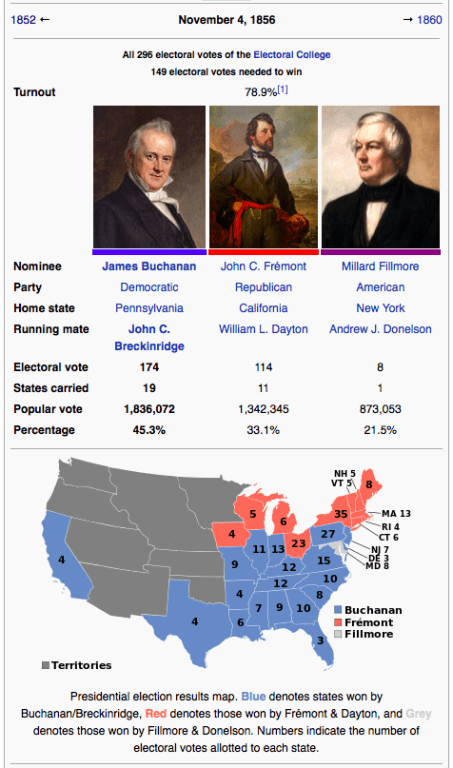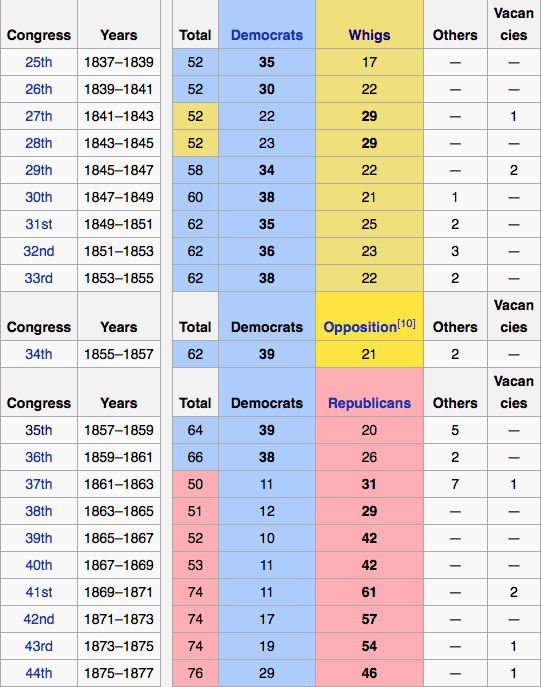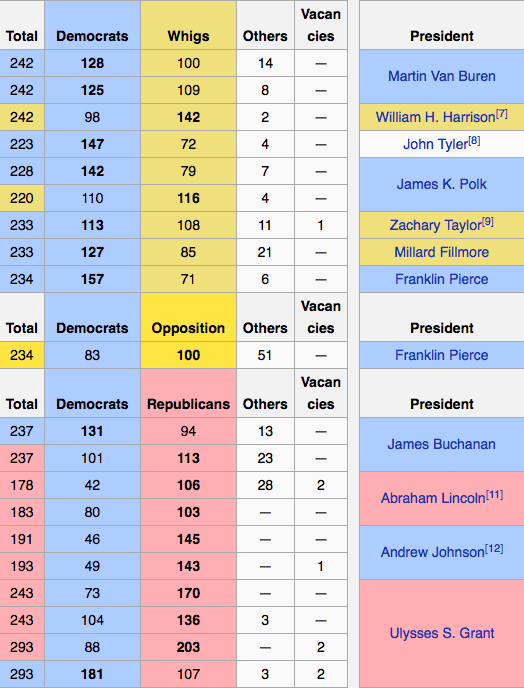I’m sure by now you’ve all seen this meme:

It’s a picture of Abraham Lincoln with the text “This is what happens when you waste your vote on a 3rd party candidate.” This meme is an attempt to persuade people to vote for Jill Stein or Gary Johnson rather than one of the two major party candidates, Hillary Clinton or Donald Trump. The idea is to convince people that a vote for a 3rd party vote is not a vote thrown away, because our two party system has in the past (once, anyway) been disrupted by people choosing to vote for a 3rd party candidate. The problem is that Abraham Lincoln was not a 3rd party candidate.
Coming into the 1850s, the U.S. had two major political parties, the Democrats and the Whigs. The Whig Party collapsed in 1854, and by that I mean completely. By 1856, four years before Lincoln was elected, the presidential election looked like this:

The Whigs didn’t even put their own candidate forward in 1856. Instead, they endorsed Millard Fillmore, the candidate nominated by the American, or “Know-Nothing,” Party. This was also the last year the Whigs held a national convention (or indeed any convention). Because of our winner-takes-all system, Fillmore, the American Party candidate endorsed by the Whigs, won only a single state, taking 8 electoral votes. For practical purposes, the contest was between the Democrats (who won 174 electoral votes) and the Republicans (who won 114 electoral votes).
What did the House and Senate elections look like that year? Did the Whigs win any seats there in 1856? I’m glad you asked! Let’s look at the Senate first.

In the election that took place in November of 1856, there were 39 Democrats and 20 Republicans elected to the Senate. There were also 5 Senators that belonged to neither of these parties, but none of them were Whigs. In other words, after the election of 1856, there were no Whigs in the Senate, and the Republican Party had roughly the same number of Senators that the Whig party had had before its collapse.
What about the House of Representatives?

The election of 1856 created a House of Representatives that included 131 Democrats, 94 Republicans, and 13 Representatives that belonged to neither of these parties—and these weren’t Whigs either.
As of 1856, the Whigs were no more. We still had two parties, yes, but those two parties were the Democrats and the Republicans. The Republicans didn’t succeed because people chose to vote for 3rd party candidates. The Republican Party was only created in 1854, and it was only created because the Whig party collapsed due to internal tensions over slavery. Indeed, many Whig leaders left the Whig Party to create the Republican Party, Abraham Lincoln among them. The Republican Party was created in 1854 because the Whig party was collapsing. The Republican Party was created out of the remains of the Whig Party.
In 1852, you had Democrats and Whigs. In 1854, the Whig Party fell apart due to internal tension, and the Republican Party was formed. That year, you had the Democrats and the Opposition, which included what was left of the Whig Party, what existed of the brand new Republican Party, and a few individuals from various smaller parties. In 1856, you had the Democrats and the Republicans. More than anything else, this showed the stability of the two-party system. Our winner-takes-all system is not set up to accommodate more than two parties. When one major party died, a new one was created and immediately took its place.
By the time the election of 1860 rolled around, the Republican Party had been the second party in a two-party system for four years. Abraham Lincoln was not a third party candidate. He was a candidate nominated by one of the two major parties. Even John Fremont, the Republican Party candidate in 1856, was not a third party candidate, because the Whig Party had collapsed so fully that they were not running a candidate. That would be the equivalent of the Democrats or the Republicans experiencing such severe internal collapse that they decide not to run a candidate in the presidential election. That is not the situation we are looking at today.
Let’s not use bad history to influence people’s political choices.
I have a Patreon! Please support my writing!















